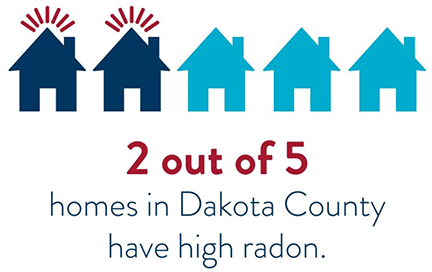 Radon is a colorless and odorless gas that is naturally found in soil. Radon can enter a home or building in many ways and accumulate in the air we breathe. Radon gas breaks down into fine particles that are radioactive. When inhaled, these fine particles can damage the lungs. Exposure to radon over a long period of time can lead to lung cancer.
Radon is a colorless and odorless gas that is naturally found in soil. Radon can enter a home or building in many ways and accumulate in the air we breathe. Radon gas breaks down into fine particles that are radioactive. When inhaled, these fine particles can damage the lungs. Exposure to radon over a long period of time can lead to lung cancer.
It is estimated that 21,000 people in the United States die each year from lung cancer due to radon exposure. A radon test is the only way to know how much radon is in your home. Radon can be reduced with a mitigation system.
Radon health risks
Radon is the number one cause of lung cancer for nonsmokers and the second-leading cause of lung cancer in smokers. Your risk for lung cancer increases with higher levels of radon and longer periods of exposure. If you smoke, the combined risk of smoking and radon exposure is higher. Reducing smoking and radon exposure greatly reduces lung cancer risk.
Test for radon
Dakota County Public Health recommends that every home in our community be tested for radon. Colder months are an especially good time to test, as heating systems tend to draw in radon gas from the soil, increasing radon levels in the home.
Radon test kits are free to county residents until spring 2026. In the spring, the county will charge $10 per radon test kit. Test kits can be picked up from Public Health at:
Test kits are limited and will be given on a first-come, first- served basis. There is a maximum of one kit per in-person request, and the department does not mail kits. Public Health is unable to distribute kits to businesses, including real estate agents.
Radon test kits are also available at local hardware and home improvement stores. Some kits require an additional fee to analyze your results. When you purchase a kit, check to see if the purchase price includes lab analysis.
After you complete a radon test
After you complete the radon testing and mail in your kit:
- Air Chek will email your results within a month of receiving your test kit.
- Determine your next step by consulting the
 radon resource materials provided to you (Spanish and Somali)
radon resource materials provided to you (Spanish and Somali)
- If a second test is necessary, get another short-term test or purchase a long-term test.
Call Dakota County Public Health at 952-891-7500 with any questions. If your home has high levels, we will let you know what resources are available to help fix it.
Reduce radon levels if they are at 4 pCi/L or higher
Any radon level poses some health risk. While it is not possible to reduce radon to zero, the best approach is to lower the radon level as much as possible. The Environmental Protection Agency (EPA) has set the action level at 4 pCi/L (picocuries of radon per liter of air). It is recommended at 4 pCi/L or higher a radon mitigation system is installed to reduce the radon level.
Radon test kits and your data
The Dakota County retention policy for all environmental health data, including radon test results and contact information, is 10 years. Data is deleted after 10 years. Dakota County does not share any names, addresses or personally identifying information.
Dakota County uses radon test kit data to learn about radon levels across the county. This helps with outreach efforts to keep communities safe. The county may follow up with you to provide information related to your test result.
Dakota County will only share radon test results with the person who originally requested the radon test kit.
Real estate transactions
Radon testing and mitigation are not required during real estate transactions, but the Minnesota Radon Awareness Act requires radon test results and education be provided by the seller to potential home buyers during residential real estate transactions in Minnesota. The county will not share radon testing results to potential buyers. Learn more about data sharing requirements on the Minnesota Department of Health's website.
Home buyers can reduce their lung cancer risk by incorporating a radon test into a home inspection. If the radon level is high, buyers can request that sellers install a radon mitigation system. Buyers who don't negotiate the radon test as part of their purchase agreement can test and mitigate their home after they move in.
Additional resources
For more information on testing for radon or to request a radon test kit, contact the Dakota County Public Health Department at 952-891-7500 or visit the Minnesota Department of Health website.
Radon resources are also available in Spanish on the Environmental Protection Agency website.